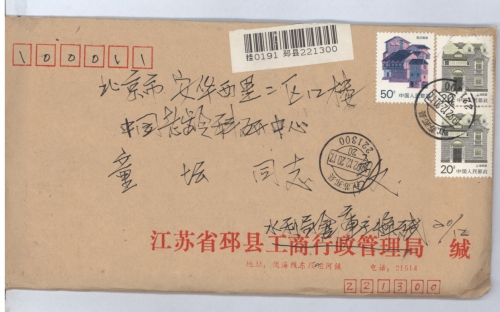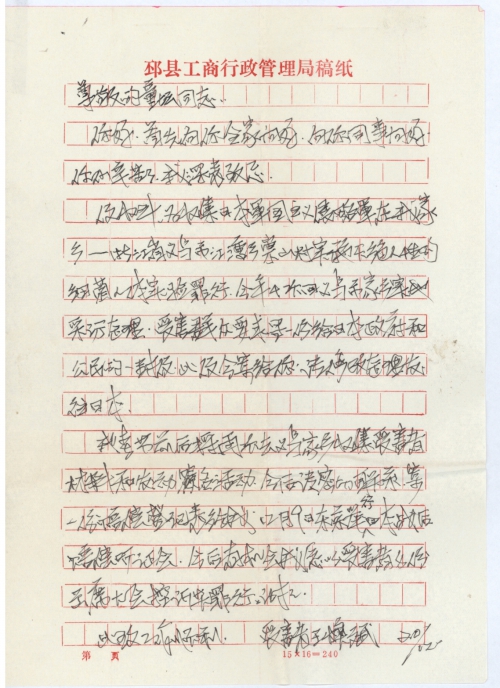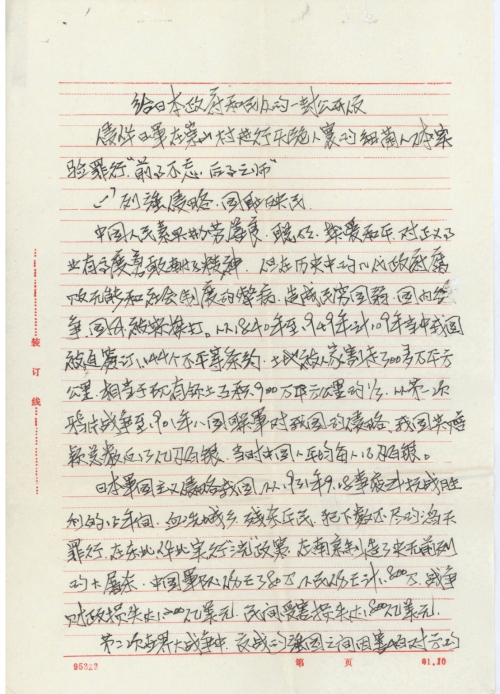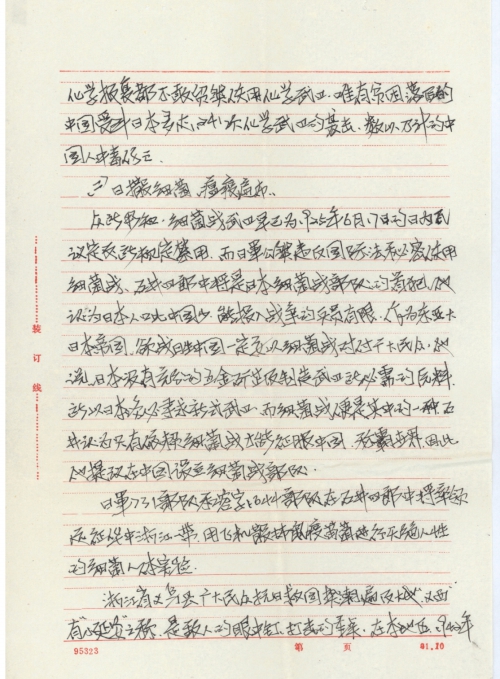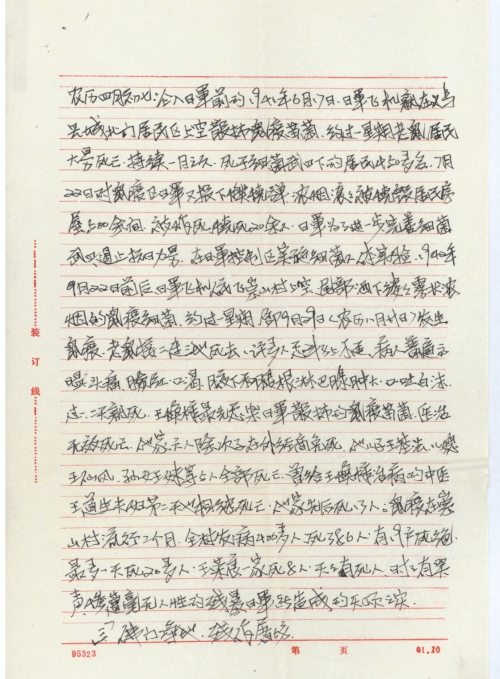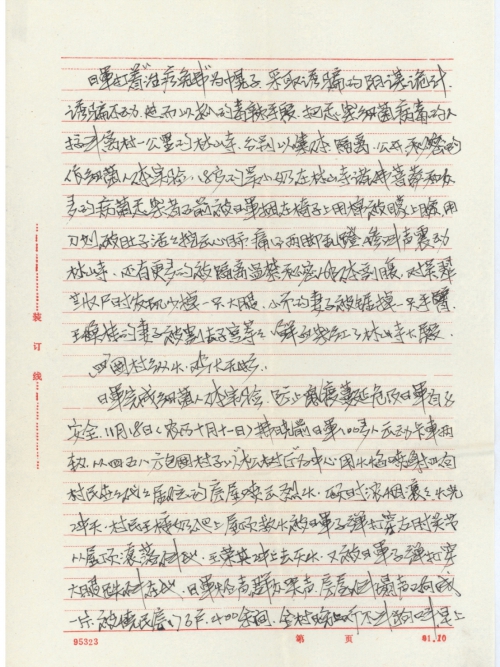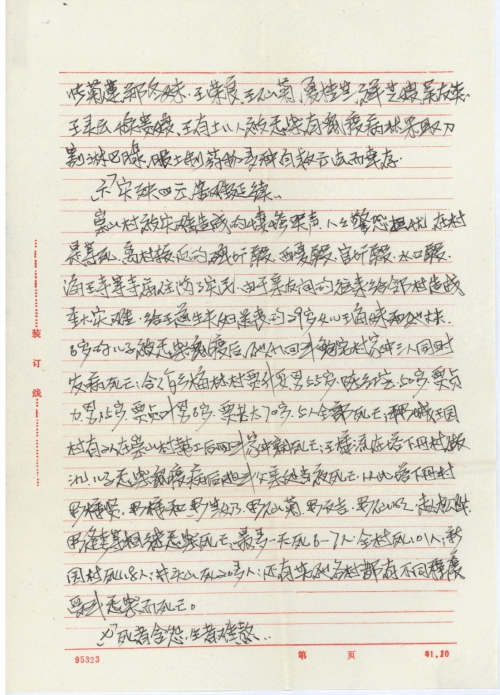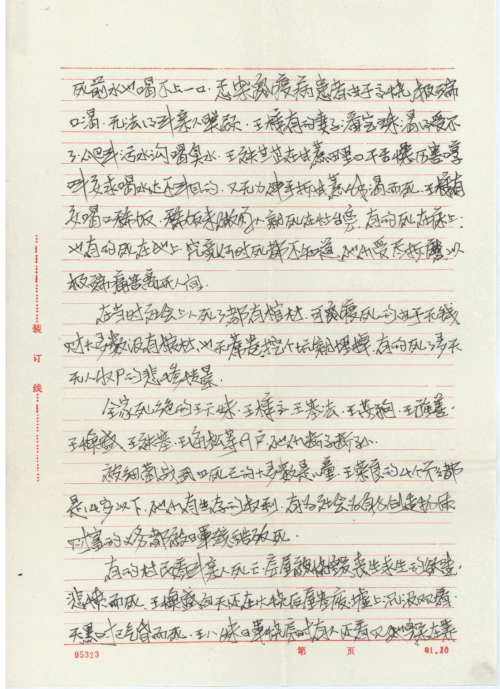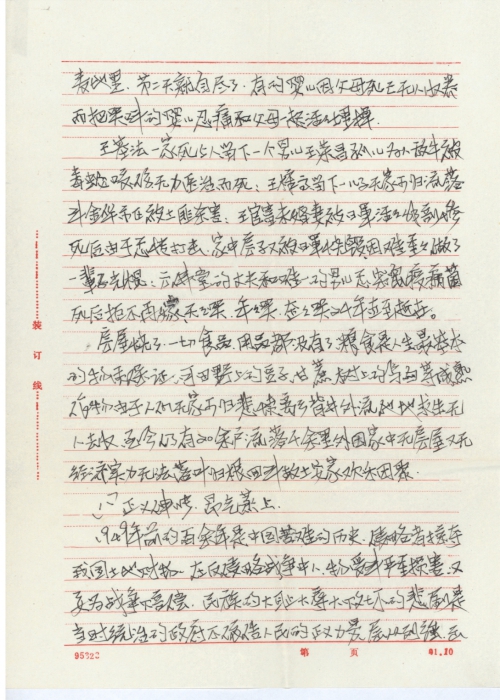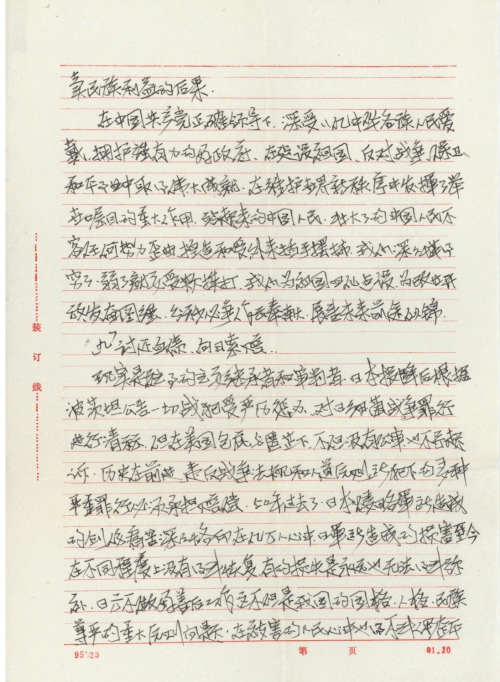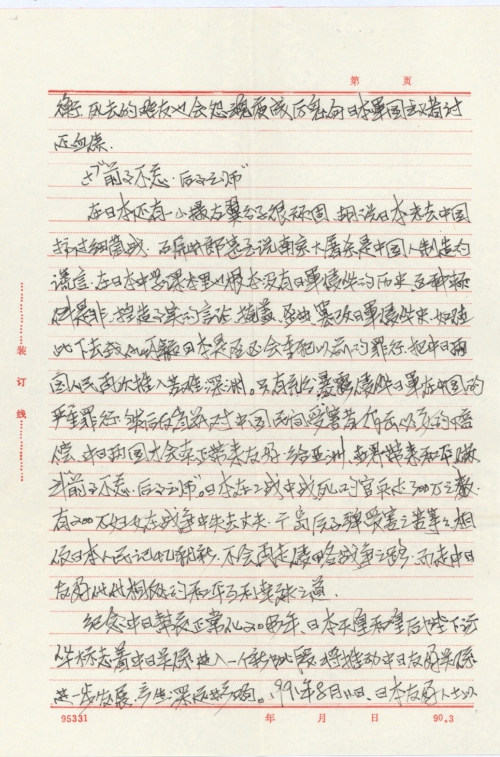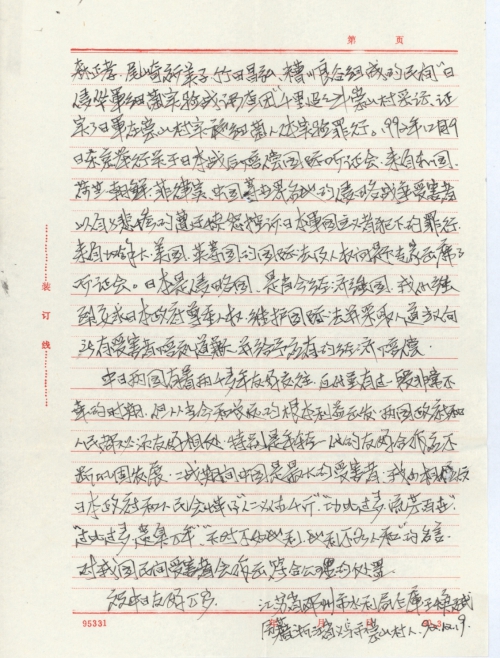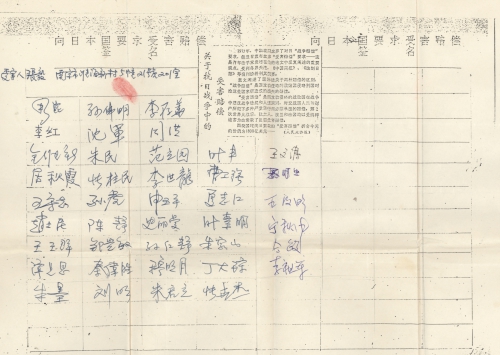Date of letter:1992-12-20
Address of author:Pi County, Xuzhou City, Jiangsu Province
Date of event:1941-06-17
Location of event:Yiwu City, Zhejiang Province
Name of author:Wang Huanbin
Name(s) of victim(s):Wang Huanzhang, Wang Jifa (Wang Huanzhang’s son), Wang Xianfeng (Wang Huanzhang’s daughter-in-law), Wang Mei (Wang Huan Zhang’s granddaughter) and other people
Type of atrocity:Biological/Chemical Warfare, Murders, Others, Other Massacres(BC, MU, OT, OM)
Other details:An open letter was sent, which was bacteria experiments conducted on humans by the Japanese soldiers. On June 17, 1941, the Japanese military aircrafts spread bacteria over the sky in Yiwu. Under the pretence of “free treatment”, the Japanese soldiers caught the people infected with the germs and conducted human experiments secretly. They also used extremely cruel means to kill the villagers; for example, they slashed a living person’s belly open and took the heart out.
Respectable comrade Tong Zeng:
How have you been?
First of all, I’d like to send greetings to your family and your colleagues for your hard work. I have a deep respect for you.
I’ve received your letter. To gather information about human experiments carried out by the invading Japanese army in my hometown Chongshan, Jiangwan, Yiwu, Zhejiang, I returned to my hometown on April 24 to carry out surveys and interviews. The victims wrote a letter to the Japanese government and people. I am now sending the letter to you for you to correct it and send it to Japan.
I will return to my hometown again to gather victim materials and launch a signature program before or after the Spring Festival. Please keep close contact with me and send me a signature form. A post-war Chinese compensation hearing meeting was held in Tokyo on December 9. If there is a chance in the future, I am willing to attend the meeting as a victim to charge the invading Japanese army of its crimes.
Thank you!
Best wishes to your work.
Victim: Wang Huanbin
December 20
A Public Letter to the Japanese Government and People
The invading Japanese army committed inhuman crimes of carrying out human experiments in Chongshan Village. “History is a guide for future.”
1. Japan’s invasion of China creates national humiliated and caused suffering to the Chinese people
The Chinese people are always kind, smart, peaceful and willing to sacrifice for just causes, but they have suffered from poverty, weakness, wars and insults due to incompetent governments and defective social systems. During 109 years from 1840 to 1949, China was forced to sign 1,114 unequal treaties, ceding territory of over 3 million square kilometers, about 1/3 of its current territory of 9 million square kilometers. From the first Opium War to the Siege of the International Legations in 1901, China compensated nearly 1.3 billion taels of silver, which averaged 16 taels of silver per Chinese during that period.
During those 15 years, from the September 18 Incident in 1931 to our victory of the anti-Japanese war, the invading Japanese army committed countless crimes such as killing innocent civilians and implementing the “Three Alls” Policy in Northeastern and Northern China, especially the unprecedented Nanjing massacre, and causing Chinese military 3.8 million casualties, 18 million civilian casualties. The war cost the government 120 billon USD, and the civilians lost 180 billion USD.
During the World War II, the developed warring countries did not dare to use chemical weapons recklessly for fear of revenge. Only the less developed China was attacked by Japan with chemical weapons for up to 1,241 times, causing death of thousands of Chinese people due to poison.
2. The Japanese army spread bacteria that caused the plague
It is well known that the Geneva Protocol, signed on June 17, 1925, prohibits the use of biological weapons. But the Japanese army secretly used biological weapons in violation of the protocol. Lieutenant Shiro ISHII, the director of a biological warfare unit of the invading Japanese Army, believed that to win the war with China, Japan must deal with the Chinese civilians through biological warfare, because Japan had a smaller population than China and had limited soldiers for the war. He once said that Japan lacked adequate raw materials necessary for producing weapons and must find new weapons, and biological weapons were one of them. He believed that only by using biological warfare could Japan conquer China and rule the world, so he proposed to set up biological warfare units in China.
Unit 731 and Unit Ei 1644, under the direction of Shiro ISHII, marched towards central China, including Zhejiang, spreading the plague bacteria using planes and carrying out human experiments.
The people in Yiwu, Zhejiang made positive contributions to the anti-Japanese and national salvation causes. West Yiwu was known as “Minor Yan’an” and was a thorn and a primary target of attack to the Japanese army. On June 17, 1941 before its fall on lunar April 7, 1942, Japanese planes spread the plague bacteria over the residential areas in northern Yiwu. About a week later, a large number of rats and residents began to die and the plague lasted a month, taking the lives of over 450 residents. On July 22, Japanese planes dropped firebombs in the plague-hit area, burning over 500 residential houses and killing over 20 people. To further improve biological weapons and curb anti-Japanese forces, the Japanese army began to conduct human experiments in the occupied areas. At about September 22, 1942, Japanese planes flew very low over Changshan Village, spreading the plague bacteria. About a week later on September 29 (lunar August 20), the plague broke out. More and more rats died and many people felt sick. The majority of patients was thirsty, and had a fever, headache, and swollen lymph glands in armpits and crotches. They would foam at the mouth and died in 1 or 2 days. Wang Huanxiang was the first to catch the plague and died despite treatment. Except his youngest son doing business in another place, all the other 6 family members died, including his son Wang Jifa, son-in-law Wang Xianfeng and granddaughter Wang Mei. Chinese traditional doctors Wang Daofu and his wife, who treated Wang Huanxiang’s disease, died the next day and 13 people from his family died one after another. The plague lasted 2 months in Chongshan Village. Over 400 people caught the disease and 386 of them died, including 19 households. Over 20 people died in a day. 8 of Wang Rongliang’s family members died. It was a terrible disaster caused by the inhuman Japanese army.
3. Temples became slaughter houses.
The Japanese army tricked people who caught the plague to Linshan Temple, which was one kilometer away from the village, in the name of free treatment, and then they conducted human experiments on these people, collectively or separately. Japanese soldiers tied 18-year-old Wu Xiaonai to a chair, covered her face with a quilt, then cut open her belly with a knife and dug out internal organs in front of the Buddhas and other patients. Wu Xiaonai kicked her feet around and screamed so loud out of pain. More patients were dissected privately. For example, when other people came to collect corpses, they found that Wu Cuilan missed a leg, Xiao Di’s wife missed an arm and Wang Huangui’s wife had her uterus removed. The temple was covered with blood.
4. The village was burned and no dogs or chicken could be seen.
To prevent the plague from endangering themselves after completing human experiments, over 100 Japanese soldiers taking two trucks surrounded the village before dawn of November 18 (lunar October 11), using flamethrowers to set fire to houses. Thick smoke and flames rose high instantly. Villager Wang Zhangnai, who climbed to the roof to save her house, was shot by Japanese soldiers in the right arm and fell to the ground. Villager Wang Rongqi trying to put out the fire was shot in the leg and fell down. There was full of gunshots, cries and the collapsing sound of houses. On that day alone, over 400 houses from 176 households were burned. No barking dogs could be heard at night and no rooster crowed in the morning. The whole village was in dead silence.
5. Narrow escapes
The then 16-year-old survivor Zhang Julian, whom the Japanese army conducted a human experiment on in the Linshan Temple, now lives in Jiangwan and recalls the horrible memory. She tried to escape from the temple while the Japanese soldiers left to burn Chongshan Village. She was too sick to run, so she climbed past familiar corpses and escaped from the back gate. Then, she moved slowly for 1km towards her house with arms on the ground and it took her 3-4 hours to get home. But her house was burned by the Japanese army and she couldn’t find her relatives. So she had to climb to Beikuang Temple. Wang Lingyun now lives in Taxiadan Village. She was 16 then. To escape from being taken away by the Japanese army, she hid in a large container in the rice-husking room with straw on it. The then 24-year-old Zheng Dongmei hid in the straw pile and stayed still when Japanese soldiers bayoneted the straw several times. 7 people including Wang Rongcheng, Wang Zhanghong, Xu Jiantai and Wang Ruhong were locked in a rice-husking room by Japanese soldiers and would be dissected soon. The room was sealed to keep villagers away from it. They had nothing to eat or drink for days in cold weather and couldn’t escape. Finally, by risking their lives, other villagers climbed to the roof, went down through the patio and saved them out. 11 people including Wang Runhua, Zhang Julian, Zheng Dongmei, Wang Rongliang, Wang Xianju, Xia Guilan, Xiang Zhisao, Wu Youying, Wang Lingyun, Huan Guisao and Wang Youtu who caught the plague survived after treatments such as cutting off lymph glands and taking homemade medicine.
6. The disaster expands.
Villagers of Chongshan were too afraid to stay there, so they fled to near-by temples such as Beikuang Temple, Xixia Temple, Guankuang Temple, Shuikou Temple and Haiwang Temple. The visits between relatives caused huge disasters to neighboring villages. Wang Daosheng couple’s 29-year-old daughter Wang Haimei, her husband and 6-year-old son caught the plague when attending their funeral and died after returning to their home in Baozhai Village. 5 people from Meilin Village, Hezuo including the 55-year-old male Jia Shengtuo, 50-year-old Chen Hongbao, 15-year-old male Jia Zhenli, 6-year-old male Jia Zhenye and 70-year-old grandma Jia died. 2 persons from Wangyuan Village, Hezhoucheng died at their houses after working as helpers in Chongshan Village. Wang Zhangliu was a wine maker in Daxiadan. His son escaped to his house after catching the plague and died on that night. After that, villagers of Daxiadan including Zhou Zhangxian, Zhou Zhanghe, Zhou Lannai, Zhou Xianju, Zhou Wenji, Zhou Xianming, Zhao Songhua and Zhou Fenglai died one after another. Even 6 or 7 people died in a single day. A total of 101 people died in Daxiadan Village, 18 in Xinyuan Village and over 20 in Jingtoushan Village. Other villages also suffered to different extents.
7. The dead died with hate and the living suffered.
Those who caught the plague were extremely thirsty due to fevers, but they could not get care from relatives or even didn’t have water to drink. Wang Zhangyou’s wife Pan Baozhu was so thirsty that she climbed to a ditch and drank stinky water from it. Wang Fulan was so thirsty in the sugar cane fields and was too weak to pick a sugar cane, so she died of thirst. Wang Zhangyou wanted to eat porridge, but he died beside the stove before the porridge was ready. Some other patients died in bed and some on the ground. We didn’t even know when they died. They suffered so much and left the world with extreme pain.
At that time, a dead person must be put in a coffin, but most of those who died of the plague did not have one due to poverty. They were simply buried in a pit. There were people who were dead for several days, but no one came to collect their corpses.
All family members of 19 households died including Wang Tianmei, Wang Zhanggao, Wang Jifa, Wang Maogou, Wang Jingshan, Wang Huansheng, Wang Meiji and Wang Haisong. They had no offspring.
Most of the people who died of chemical weapons were children. Wang Rongliang’s 4 younger brothers were all less than 14 years old. They had the rights of reproduction and the ability to create value to the society, but they were cruelly killed by the Japanese army.
Some villagers died in grief and indignation when seeing their relatives died and houses burned. Wang Huansheng silently looked at the ruins of his house in the day and died of indignation at night. Someone saw Wang Bamei hiding in the buckwheat fields when the Japanese army burned the houses. Later she killed herself the second day. Some babies were buried alive with their parents since no one would adopt them.
5 of Wang Jifa’s family members died and only a boy Wang Rongchang survived. But he was bitten by a viper while driving cattle for others and died due to lack of treatment. As for Wang Zhanggao’s family, only one of his sons survived and became homeless. He wandered to Jinhua city and was killed by bandits. After Wang Guanfu’s bride-to-be died of dissection by the Japanese army, and his house was burned, he was heavily hit and struggled all his life as a bachelor. After Fang Futang’s husband and only son caught the plague and died, she did not marry again and cried for 24 years until she died.
The houses were burned and all food and supplies were gone. Food is the most basic guarantee of our life. After the indignant, homeless villagers left their hometown, there was no one to reap mature crops such as beans and sugar canes in the fields and dark plums on the trees. Up until today, over 20 households are still living a vagrant life and cannot return to their hometown because they had no houses there or had no money to rebuild one.
8. Pursuing justice
Over 100 years before 1949 is a painful history for China when invaders plundered our land and property and we suffered severe losses in the war and had to make war reparations. The shame of our nation is caused by the then ruling government succumbing to powerful nations and betraying national benefits instead of depending on the people’s righteous power.
Under the leadership of the Communist Party of China, which is strongly admired and supported by 1.1 billion of Chinese people, the powerful government has played a great role in building our country, protesting wars, defending peace and maintaining the world’s new order. The Chinese people have stood up and grown stronger and we do not tolerate any distortion, fabrication or intervention from outside forces. We deeply understand that poverty and weakness lead to insult, so we positively devote to the construction of four modernizations and the opening-up. We have a bright future in front of us.
9. Demanding compensation from Japan
Reality is the primary successor and judge of the past. According to the Potsdam Proclamation signed after Japan’s surrender, all war criminals must be severely punished, but no public trials or charges took place due to the protection of the United States of America. History is moving forward. The Japanese army must undertake the liability of compensation for committing serious crimes in violation of the laws of war and humanitarian principles. 50 years have passed, but millions of Chinese people are still feeling the trauma and pain caused by the invading Japanese army. The damages caused by them have been recovered to different extents and some damage can never be made up for. Japan’s compensation to Chinese victims is a major issue of principle to the dignity of our country and people. If Japan does not properly implement the work, the Chinese victims will never feel being compensated with justice, and the dead souls will come back and pursue justice against Japanese militarists.
10. History is a guide for future.
A small number of Japanese right-wingers lied that Japan never started biological warfare in China and XX ISHIHARA even said that Nanjing Massacre was a lie made up by Chinese people. In addition, the history of Japan invading China is not included in Japanese middle school books. Their distortion of the history makes me suspect that Japan may commit past crimes again and push Chinese and Japanese people into the abyss of misery again. Only by fully revealing the invading Japanese army’s severe crimes in China and making necessary compensation to the Chinese civilian victims can Japan and China have a true friendship, can peace be truly brought to Asia and the world by using history as a guide for future. During the World War II, 3 million of Japanese officials and soldiers died and 2 million of Japanese women lost their husband. I believe the Japanese people still have a fresh memory of their suffering due to the Hiroshima atomic bombing. Thus, Japan will choose the path of a Sino-Japanese friendship instead of a war of aggression.
This year is the 20th anniversary of the normalization of Sino-Japanese diplomatic relations. Japanese emperor and empress’ visit to China marks that the Sino-Japanese relations have entered a new stage and will promote the further development and have a profound influence on the Sino-Japanese friendship. On August 11, 1991, friendly Japanese people including Masataka MORI, Yoshiko OZAKI, Masahiro TAKEDA and Yoshiya KASUKAWA established a private investigation group to interview Chinese people in Chongshan Village about human experiments conducted by the invading Japanese army. They proved the Japanese army’s crime. On December 9, 1992, a post-war International hearing was held in Tokyo, in which victims from South Korea, the Netherlands, North Korea, the Philippines and China charged Japanese militarists with crimes by sharing their own suffering. Experts on international laws and human rights from Canada, the U.S.A and the UK attended the hearing. Japan is the invading country and an economic power. We strongly demand the Japanese government to respect human rights and apologize to and compensate all victims in accordance with international laws and humanitarian principles.
China and Japan have a friendship for over 2,000 years despite an unfortunate period. But for the sake of short-term or long-term interests, the two governments and peoples must get along well, especially the younger generations. China is the biggest victim of the World War II. We believe that the Japanese government and people know famous sayings such as “Justice is worth a thousand gold pieces.” “One becomes immortal if he has more credit than fault” and “Harmony is more important than right time and place.” We demand the Japanese government to properly handle the issue with Chinese civilian victims.
Best wishes to the Sino-Japanese friendship.
Warehouse, Water conservancy bureau of Pizhou, Jiangsu
Wang Huanbin
Born in Chongshan, Yiwu, Zhejiang
December 19, 1992
Signatures in demanding damage compensation against Japan
Compensation for damage caused by the anti-Japanese war
The Chinese government gave up war reparations against Japan in 1972, but it has never given up damage compensation. As an important viewpoint repeatedly expressed by young jurist Tong Zeng in his paper, it has attracted wide attention and has been published in newspapers such as China Business News and Legal Daily
In his paper, Tong Zeng explained the difference between war reparations and damage compensation in accordance with the International Law: War reparations are paid by the defeated country that launched the war to the invaded countries for their losses, while damage compensation is paid by the defeated country that launched the war for violating the laws of war and humanitarian principles during the war and committing serious crimes to the people and property of the invaded countries. After the World War II, the Jews, Polish and French people claimed for a large amount of damage compensation on the grounds of Nazi persecution.
And the damage compensation claimable by China against Japan is 180 billion USD.
CPPCC News
Signatures in demanding damage compensation against Japan
Compensation for damage caused by the anti-Japanese war
The Chinese government gave up war reparations against Japan in 1972, but it has never given up damage compensation. As an important viewpoint repeatedly expressed by young jurist Tong Zeng in his paper, it has attracted wide attention and has been published in newspapers such as China Business News and Legal Daily
In his paper, Tong Zeng explained the difference between war reparations and damage compensation in accordance with the International Law: War reparations are paid by the defeated country that launched the war to the invaded countries for their losses, while damage compensation is paid by the defeated country that launched the war for violating the laws of war and humanitarian principles during the war and committing serious crimes to the people and property of the invaded countries. After the World War II, the Jews, Polish and French people claimed for a large amount of damage compensation on the grounds of Nazi persecution.
The damage compensation claimable by China against Japan is 180 billion USD.
CPPCC News
















